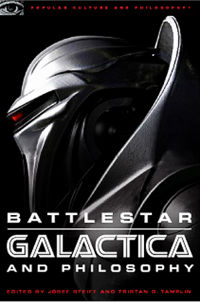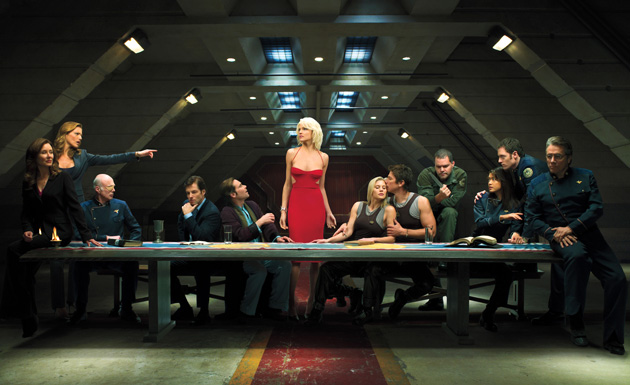There is an interesting intersection between religion and science fiction at times, and a notable example of this comes with the 1970s television series Battlestar Galactica and Mormonism. The show was presented in a new incarnation as a series on SyFy from 2004-2009 which was very well received by fans, and which was very different than the 1970s version. While reading through Battlestar Galactica and Philosophy (Open Court, 2008), among a number of interesting chapters and topics one in particular stood out, a piece by Ivan Wolfe titled “Why Your Mormon Neighbor Knows More about This Show Than You Do.” On Battlestar Galactica Wiki we find additional information about Mr. Wolfe:
He has also published and presented the following academic papers on Battlestar Galactica: “The Lost Tribes of Mormon Science Fiction Literature: Battlestar Galactica in Books and Comics.” (in the AML Annual 2002. Provo, Utah: Association for Mormon Letters, 2002) and “Epistemology and Ontology in Batttlestar Galactica and Mormon Theology.” (presented at the 2007 Southwest/Texas Popular Culture/American Culture Association 28th Annual Conference, The Hyatt Regency Conference Hotel, Albuquerque, NM; February 14-17, 2007).
Wolfe is well versed in the relationship between Battlestar Galactica and Mormonism, and we discuss this topic, and the general issue of science fiction and Mormonism, in the following interview.
TheoFantastique: Ivan, thank you for coming to discuss this topic. I’d like to begin with your personal story. How did you come to develop an interest and work in science fiction, and Battlestar Galactica (BSG) in particular?
Ivan Wolfe: Well, I’m a practicing Mormon. I was raised Mormon, and when I was a kid watching BSG in syndication, I noticed that a lot of the terminology (Council of the Twelve, marriage for all the eternities, among other aspects) on the show sounded a lot like what I was hearing in church on Sunday. Of course, as a kid it took me three times through the Chronicles of Narnia to understand that Aslan = Christ, so I didn’t get the resonances right away with BSG. However, once I did realize what was going on, it seemed interesting, but not necessarily something worth studying or writing about.
 However, when I went to college at BYU (Brigham Young University in Provo, Utah – the LDS Church owned institution of higher education), I got involved with the science fiction community there. I decided to write an essay on BSG and Mormon thought for a class, but in doing the research, I found what had been written wasn’t very good. A few disparaging comments from Orson Scott Card, and only one major academic article that was full of errors (some minor issues like Baltar misspelled as Boltar, but also several major factual errors about the series itself).
However, when I went to college at BYU (Brigham Young University in Provo, Utah – the LDS Church owned institution of higher education), I got involved with the science fiction community there. I decided to write an essay on BSG and Mormon thought for a class, but in doing the research, I found what had been written wasn’t very good. A few disparaging comments from Orson Scott Card, and only one major academic article that was full of errors (some minor issues like Baltar misspelled as Boltar, but also several major factual errors about the series itself).
This was before the new series was even announced. I believe at the time, Richard Hatch hadn’t even filmed his “Second Coming” trailer. There were a few comics that were out, and I made an effort to collect all of them, as well as the book series co-authored by Hatch. I presented an essay at the AML (Association for Mormon Letters) about the topic, and figured that was about it. A few years later, the new series came out and was a big hit. I was skeptical at first, but the first two seasons were good enough that I stuck with the whole series, despite my disappointment with the final season.
Now, based on my conference presentations and published essays, I’m probably the greatest living expert on Mormonism and Battlestar Galactica.
TheoFantastique: Perhaps we can move from the general to the specific as we discuss this topic. I remember being surprised a few years ago when I discovered at Adherents.com that a disproportionally large number of Latter-day Saints are science fiction writers, compared to other religious populations. Why is this? It’s interesting to me to see the affinities between some religious traditions and certain genres of literature and film. For example, pagans seem to have a connection to fantasy and horror, and it seems as if there is a strong connection between Mormonism and science fiction. Would you have any feel for why there is this strong connection? What is it about the Mormon faith that helps it come together so nicely with science fiction?
 Ivan Wolfe: There are several reasons. Two that come to mind immediately are the novel Added Upon and Marion K. Smith. Added Upon was the first “Mormon Novel” in that it was the first work of fiction written by a Mormon for other Mormons to deal directly with Mormon issues. It’s an odd little book, full of theological speculation, down to earth events, and spiritual warfare. But one section of it is clearly utopian and even discusses advanced technology. It’s partly science fiction, and I think the looking forward to a utopian future on the Earth with Christ in charge gives Mormons a world view amenable to future speculation.
Ivan Wolfe: There are several reasons. Two that come to mind immediately are the novel Added Upon and Marion K. Smith. Added Upon was the first “Mormon Novel” in that it was the first work of fiction written by a Mormon for other Mormons to deal directly with Mormon issues. It’s an odd little book, full of theological speculation, down to earth events, and spiritual warfare. But one section of it is clearly utopian and even discusses advanced technology. It’s partly science fiction, and I think the looking forward to a utopian future on the Earth with Christ in charge gives Mormons a world view amenable to future speculation.
Marion K. “Doc” Smith was a professor of English at BYU (he has since passed on), and he nearly single handedly helped nurture and protect the science fiction community at the largest church owned university. He taught the science fiction writing and literature classes, and was the faculty advisor for everything sf related on campus, from the club Quark to the semi-professional magazine The Leading Edge to the annual academic symposium “Life, The Universe, and Everything.” A lot of nationally published LDS sf authors came out of his classes.
TheoFantastique: Who are some of the more prominent LDS science fiction writers that readers may not be aware of?
Ivan Wolfe: Tracy Hickman, co-author of the Dragonlance series and author of a few other science fiction and fantasy novels. M. Shayne Bell, Lee Allred, Eric James Stone – all are great authors. Mike Allred is a comic book creator (most famous for Madman) who is also adapting The Book of Mormon (the actual book, not the musical) in graphic novel format. Brandon Sanderson is more fantasy than science fiction, but outside of Orson Scott Card, he’s the most prominent LDS author on the market right now.
 TheoFantastique: Moving to your contribution to the book Battlestar Galactica and Philosophy, many know of the Mormon influence in the series of the 1970s, but not whether or how it might find itself in the more recent television series. What types of elements or influences from Mormon cosmology do you see in the series in its various incarnations?
TheoFantastique: Moving to your contribution to the book Battlestar Galactica and Philosophy, many know of the Mormon influence in the series of the 1970s, but not whether or how it might find itself in the more recent television series. What types of elements or influences from Mormon cosmology do you see in the series in its various incarnations?
Ivan Wolfe: The original series is clearly built upon several LDS principles. The ideas of eternal progression (the ultimate destiny of humanity is to become gods themselves), marriage for eternity, the existence of Satan (Count Iblis in the original series), and Kobol/Kolob as an originating place all come from Mormon beliefs. Even the Egyptian motifs of the costumes in the original series likely come from the LDS belief that Abraham taught the Egyptians astronomy and that some Egyptian mummies acquired by founder Joseph Smith were accompanied by sacred writings (see “The Book of Abraham” in the LDS scripture The Pearl of Great Price).
The more recent series keeps a few of the terms, but has a completely different cosmology. Instead of eternal progression (as God is, man may become), it’s built on the idea of doing the same thing over and over again (all this has happened before and will happen again). There are echoes, but no real LDS substance. The various comic books and novels are similar. Richard Hatch’s co-authored novels go into a very different direction, replacing a lot of the Mormon ideas with totally new ones, while still keeping some of the same terms.
One of my biggest disappointments is that there was no Iblis figure in the new BSG, unless one decides that GOG (the “God of Galactica” – though it doesn’t like being called “God” – referenced in the series finale’s final moments) is the Iblis figure. That interpretation might actually improve the ending, though it would make it a lot more depressing.
TheoFantastique: Do you see science fiction as a continuing place for Mormon writers, television producers, and perhaps film producers, to continue to incorporate and express aspects of their beliefs?
Ivan Wolfe: Well, yes – but, that applies to pretty much anyone. Catholic, Democrat, Agnostic, Socialist-Anarchist – whatever the belief system, people will use science fiction (and other genres) to express their beliefs. I’ve read lots of hard right wing military science fiction and many far left utopian novels – and lots in between. My favorite science fiction novel is A Canticle for Leibowitz (though I did not care for the sequel) and my favorite author is Gene Wolfe (no relation). Gene Wolfe is Catholic, and Canticle is a very Catholic novel.
I expect Mormons will continue to create science fiction for as long as there are Mormons.
TheoFantastique: Ivan, thank you again for discussing this topic here.
Ivan Wolfe: Thank you! For those interested, I will also have an essay in the upcoming Sherlock Holmes and Philosophy from Open Court. It isn’t about anything specifically Mormon or religious, but it deals with the terms “canon” and “apocrypha”, and so I discuss religion briefly in the essay.
Related posts:
“Cylons in America: Interview with Editors of New Book on Battlestar Galactica”
“Caprica: Television, Tech, and the Sacred”
“James McGrath on Religion in Science Fiction”
“Douglas Cowan Interview Part 1: Forthcoming Book ‘Sacred Space'”
“Douglas Cowan Interview Part 2: Sci-Fi, Transcendence, and ‘Sacred Space'”






Has Glen Larson become a nonperson? It seems bizarre that an interview like this can cover Richard Hatch, Tracy Hickman and Marion Smith, but ignore Larson, who was almost solely responsible for the intersection of BSG and Mormonism.
No, he’s not a non entity. If you click through to the articles I wrote on Millennial Star or read the essay in BSG & Philosophy, you’ll seem him discussed. Since this interview was conducted in that context, I guess I didn’t feel the need to mention Larson – but perhaps I should have.